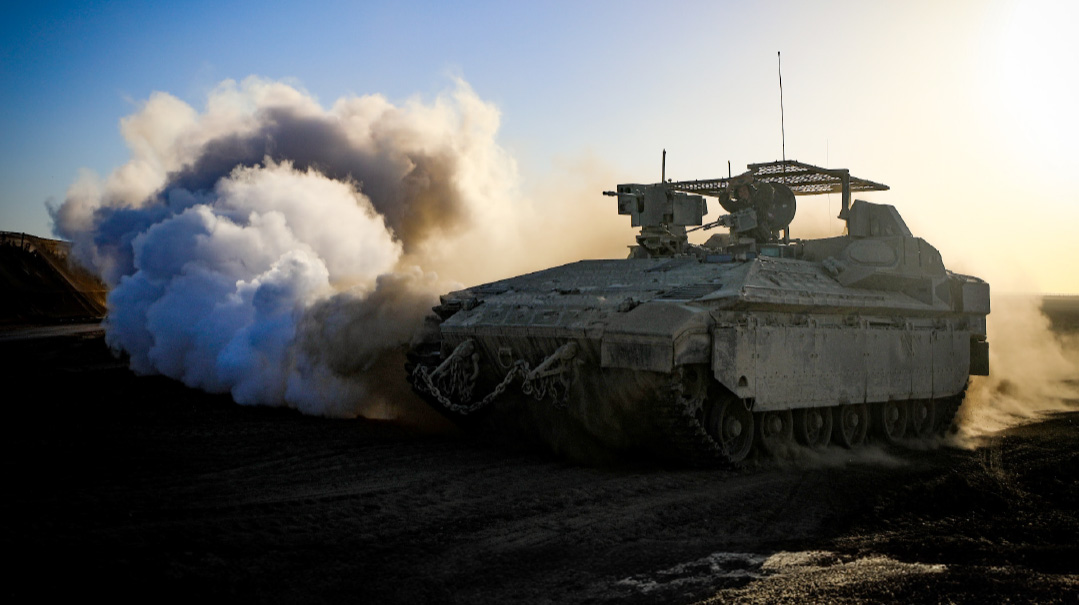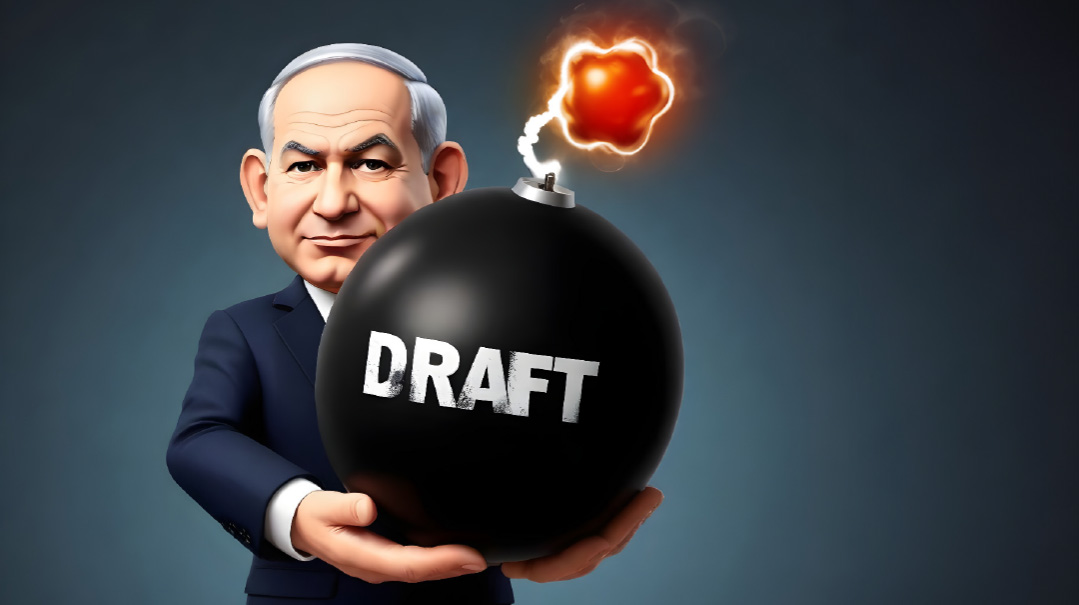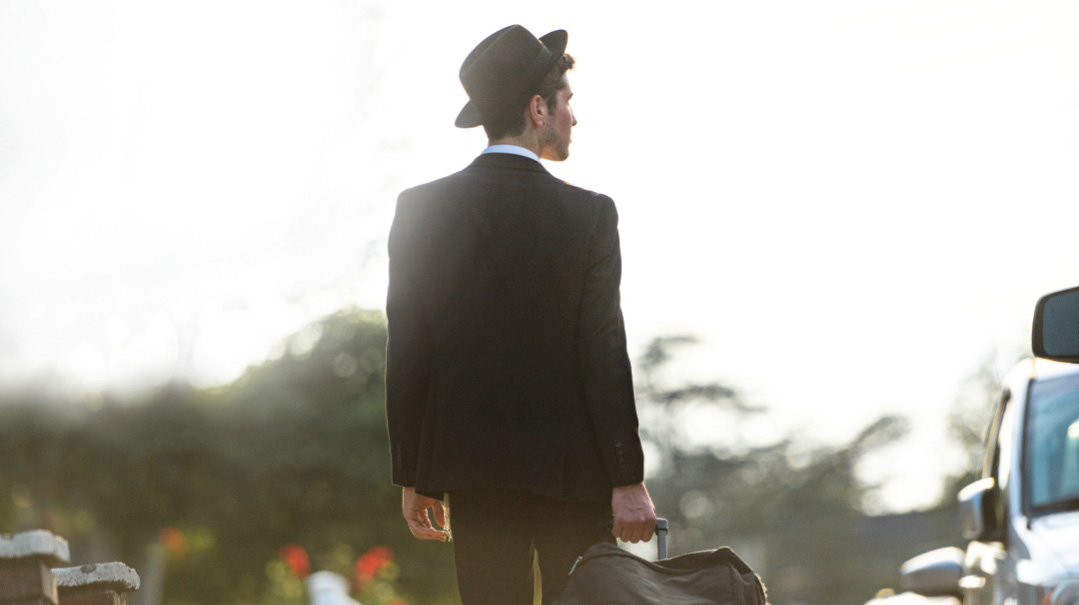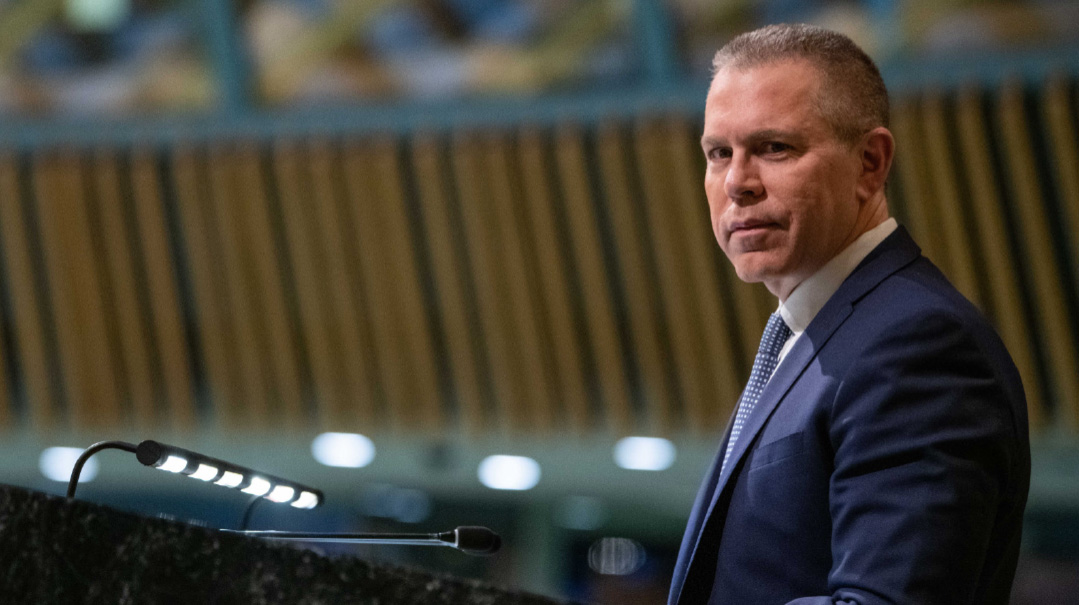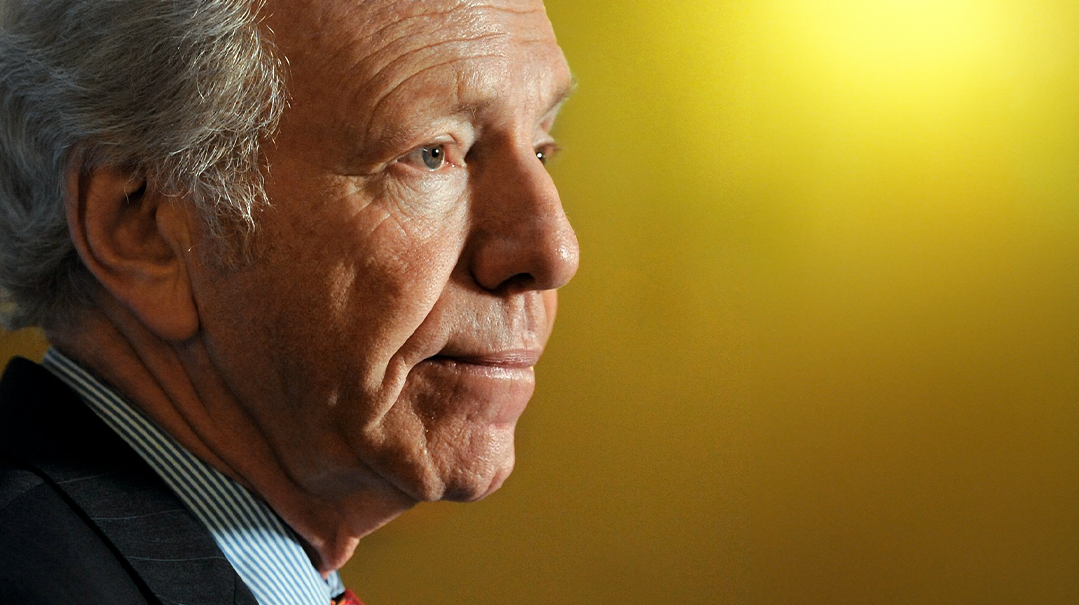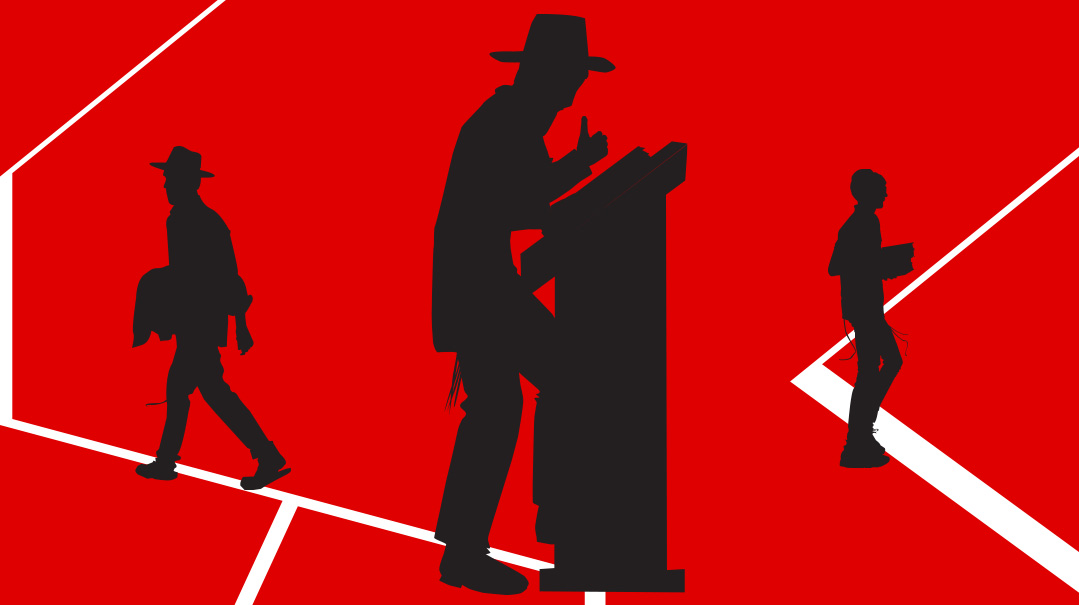Holding the Line

Ukraine's Jewish soldiers battle on despite the odds
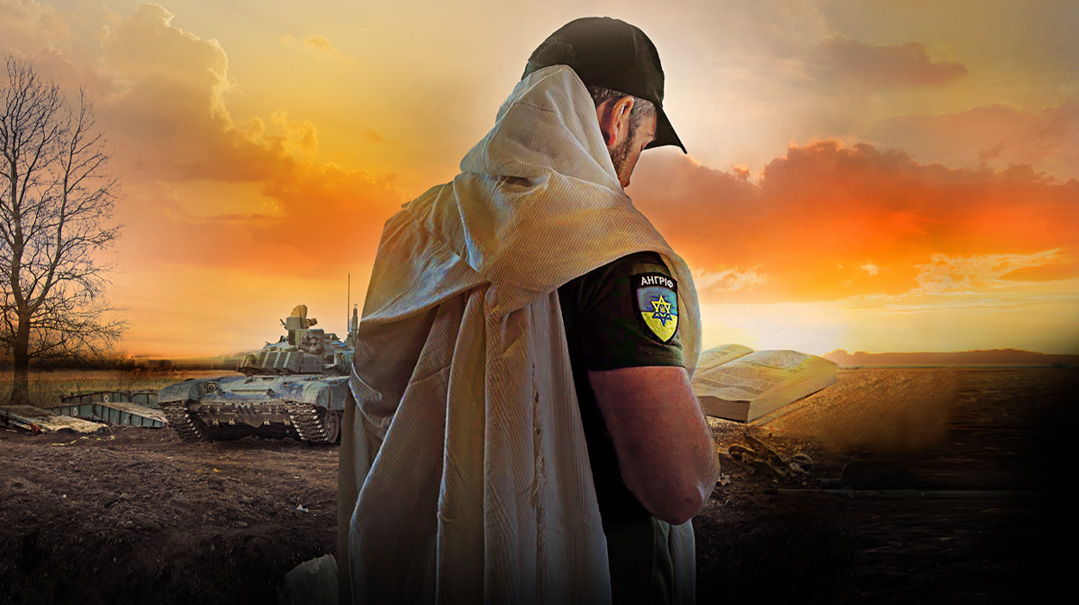
Photos: Hillel Cohen, Binyamin Chamara
It’s a sunny morning near Mykolaiv, and the sound of heavy machinery in this corner of southern Ukraine’s breadbasket ought to be the roar of tractor and the clank of harvester.
Instead, the bucolic countryside visible over Senior Lieutenant Valery Prusalovsky’s shoulder is marred by the maneuvers of heavy artillery and the whine of incoming rounds.
The white-haired Jewish career officer is grim-faced as he stares into our video call, and for good reason. After months of stinging losses and failed campaigns, Russia’s army finally has the war that its artillery-based forces are built for.
With a more than twenty-to-one ratio in rockets, artillery and mortars in their favor, Putin’s forces have adopted a new strategy that’s impervious to Ukraine’s tactics of tank-hunting with anti-armor missiles. Instead, the Russian army is pounding Ukrainian defenses into submission and slowly gaining ground in the Donbas in eastern Ukraine, and around Kherson in the south.
“If we had heavy weapons, then we could retake Kherson,” says the Kharkiv-born Prusalovsky. “But without them, we can’t attack at all.”
Echoing the lieutenant’s front-line view, Ukraine’s deputy head of military intelligence, Vadym Skibitsky, told the Guardian last week, that his forces had “almost used up all of our ammunition.” The military, he said, was firing only 5,000 to 6,000 artillery rounds a day, or a tenth of what Russian forces were sending over.
Just a month after NATO Secretary-General Jens Stoltenberg said that Ukraine was positioned to win, Zelensky’s forces are suddenly in desperate straits.
High casualties have led to rising rates of desertion, and bitterness toward European allies who have talked a good war and failed to deliver the weapons systems that Donbas’s desperate defenders need.
In a series of conversations with some of the Ukrainian army’s thousand-strong Jewish contingent, the country’s evolution into a place where Jews need not fear displaying their Jewishness was a repeated theme. But dominating the soldiers’ conversation was the current supply crisis — and the fear that with a resurgent Russia, this brutal war won’t end anytime soon.
“Give us guns!”
In a large, garishly painted gym near Kherson, a group of civilians are on their way to becoming hastily trained infantrymen, more bodies to man the crumbling ramparts that are Ukraine’s borders.
Dressed in a motley mix of combat fatigues, olive-green T-shirts, and even one blue-and-white-striped undershirt, the group of about twenty men creep along the white lines of the basketball court, Kalashnikovs aimed and steady, as if they were at the battlefront.
Their movements are directed by instructions barked by a set of young drill sergeants, who in turn answer to another camo-and-olive green-clad figure.
Only one thing sets him apart: the blue-and-yellow unit insignia on his sleeve in Hebrew proclaims what Binyamin Chamara is happy to tell anyone: as well as an infantry-tactics instructor, he’s a committed Orthodox Jew.
“We have a half-million people on the front line against Russia, and 95 percent of them are civilians, not professional soldiers,” he says in passable English. “My job is to train soldiers very quickly, because against the gigantic Russian army, we have no time.”
Like many of those now serving under their country’s colors, Kyiv-born Chamara wasn’t in the army when hostilities broke out. He was a businessman who spent time in Hungary and Germany. But his path to military instruction came because of extensive special forces training — generically called “Spetsnaz” after the elite Russian commando unit — that he’d undergone from 2012 to 2014.
“Hashem gave me the ability to teach, and this is what I’m using it for,” he says.
From his work behind the lines, the infantry instructor is witness to Ukraine’s current crisis, both in terms of supply and the fate of his soldiers.
“We don’t have what we need for the job,” he says. “We have old rifles manufactured in Yugoslavia in 1968, but to train infantry, you need paintball guns to practice. Instead, we have to hold real weapons and shout ‘bang, bang!’ ”
The shortfall in basic equipment that Chamara sees is magnified at the front with fatal results for the soldiers.
“Good training saves soldier’s lives, and our soldiers have far higher motivation that the Russians” he says, “but the lack of artillery is killing them. Eighty-five percent of the war is now an artillery duel, but we have less than 150 howitzers, and we need 600 to 700.
“Normal tactics are to send in infantry to mop-up resistance only once an artillery barrage has weakened enemy defenses,” he explains. “This is what my men are trained to do. But since we have such a shortfall in artillery, the infantry attack much stronger defenses, and more soldiers die.
“The morale of our soldiers is down,” he admits, “because while we’ve improved our tactics, so have the Russians. And they’re now sending regular soldiers, instead of badly trained conscripts, at the same time as we are running out of weapons.”
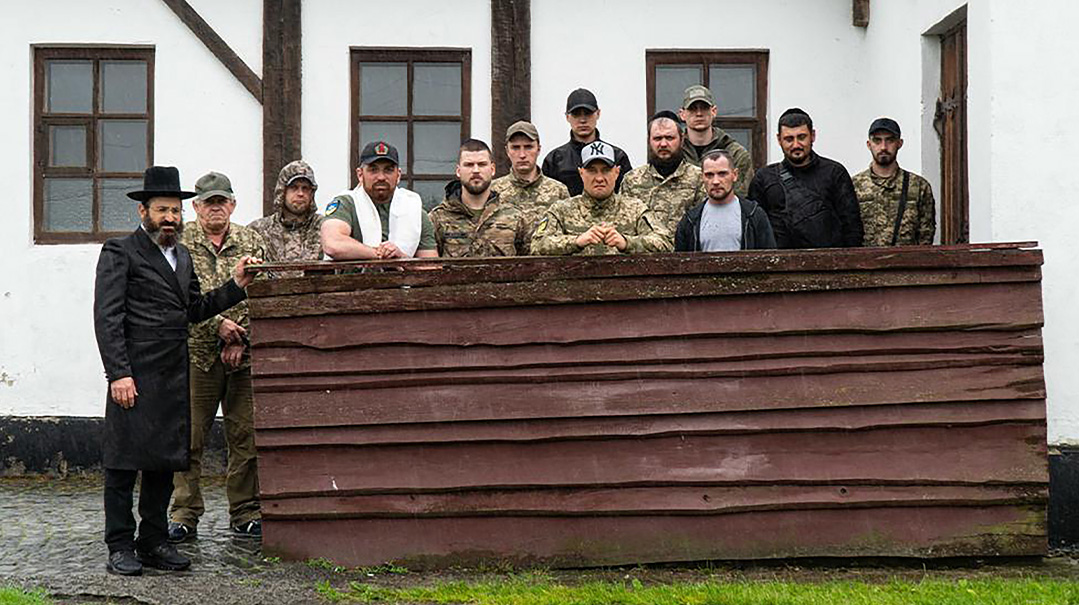
Short of Supplies
But it’s not just large weapons systems. Just how dire Ukraine’s supply situation is, says Ruslan, a muscular 41-year-old from Kyiv with a Jewish grandmother, is obvious to him every day.
“The fighting in the east is very difficult now. Our soldiers have no helmets, no flak jackets, and no ammunition. They don’t even have Kalashnikov bullets, and sometimes they don’t have water.”
Ruslan, a former businessman whose family live in Ashkelon, describes in halting Hebrew his work supplying the front lines.
He’s spent months ferrying everything from food to ammunition and drones into the battle zone, as an accredited volunteer in the army’s logistics branch, but having just visited Donetsk, the critical battlefront in the east, the story that Ruslan tells is one of increasing desperation. As Russia’s far larger forces are finally concentrated to effect in the industry-heavy Donbas region in the country’s east, it’s the Ukrainians who face critical supply problems.
The fears about the current setbacks recall the early days of the war. When Russia first massed forces to invade Ukraine last year, the world saw Kyiv’s outgunned soldiers and Molotov cocktail-armed civilians, and prepared for a massacre.
But as the Kremlin’s forces were beaten back from Kyiv’s suburbs, a new picture emerged.
Armed with British anti-armor weapons, Ukraine’s soldiers turned out to be effective, preying on Russian tank columns in wolf packs, and singing “God Save the Queen” while their missiles decapitated lumbering Russian tanks.
Videos of Ukrainian farmers towing away Russian armored vehicles with their tractors led to an Internet meme about the third-largest army in the world being comprised of Ukrainian farmers.
Ukrainian military success led to complacency, and European countries such as Germany, which had promised to arm Ukraine, slow-walked their commitments.
According to the New York Times, Pentagon officials blame the ammunition shortfall on the exhaustion of old Soviet and Russian weaponry from former Eastern Bloc states before new Ukrainian troops are trained on new Western weapons systems.
But according to Binyamin Chamara, the sense in Ukraine is that some European allies are unwilling to back their verbal support with weapons and cash.
“England has been super — they have given us weapons, as have the Americans. We have the NLAW, Javelin, and Stinger”—a reference to advanced anti-tank and anti-aircraft systems that enabled the Ukrainians to win the battle for Kyiv. “But Germany and Italy are playing a double game with Russia.”
A member of Ukraine’s younger generation, Chamara is surprisingly ready to critique some of the failings in his own society that have led to the current crisis.
“The attitude here has been to wait for outside help from America and Europe,” he says. “There’s a tendency to wait for Mashiach, but only we can really help ourselves. And we create our own problems.”
One example, he says, is that there are currently major amounts of supplies waiting in western Ukraine that never make it the battlefront due to corruption.
“I was in Kherson, and there was a terrible shortage of medical equipment, so I contacted an NGO in Lviv, and it turned out that there were warehouses full of medicines. But that didn’t make it to the right place.
“That’s because for seventy years under the Soviet Union, the government taught us to steal and not think about society. The result is the black market in stolen humanitarian supplies. All Ukrainians suffer.”
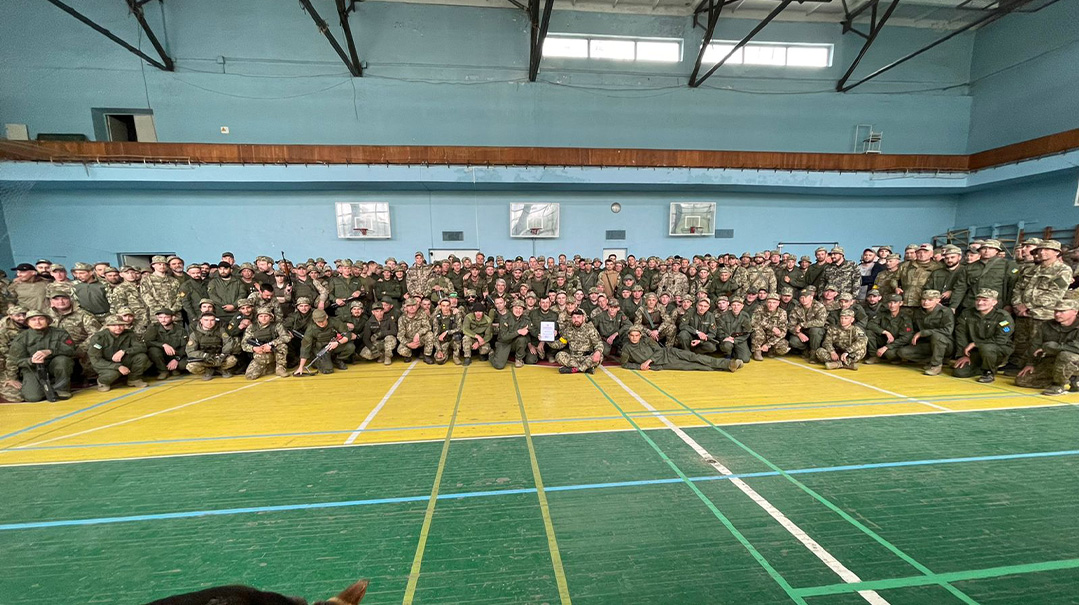
Ukrainian soldiers assembled for boot camp in a basketball court.
Emergency Services
Michael Yonah Harshevsky and his ambulance have got to be one of the oddest sights of the Ukrainian war. Michael’s day-glow orange vest with Hebrew writing is straight out of Hatzalah central casting; his large black yarmulke and imposing beard could be out of the nearest shtibel in Boro Park.
But the Kalashnikov next to his seat, combat fatigues, and prominent collection of Hebrew combat patches are certainly not standard issue even in a notably motley army.
A lawyer in civilian life, Harshevski has spent months evacuating civilians and soldiers to emergency medical care as a senior paramedic. Along the way, he’s become a highly visible symbol of Ukraine’s welcome to Jews.
“I’m originally from Donetsk, and I lived when the Russians invaded in 2013,” he says. “When the war broke out, I asked myself what I should do. This is the country of my parents, and there’s now no anti-Semitism in Ukraine, so I decided to stay and help. I sent my 16-year-old son out of the country, and I remained to save lives.”
Harshevsky’s contention about the absence of anti-Semitism is one that flies in the face of recent experience in the historically anti-Semitic country. But the medic is adamant: “Look how I can walk around,” he says pointing to his beard and prominent Hebrew insignia.
“Of course, when many of the soldiers — who come from villages where there are no Jews — see me, they don’t know what to make of me. But there’s no hatred. In fact, they like Israelis.”
Affinity with Israel is perhaps natural in a country with a Jewish president and defense minister — or as Harshevsky puts it, “Abarbanel, Disraeli, Zelensky — somebody needs to make the decisions.”
But Israel’s refusal to sell Ukraine advanced weaponry, for fear of provoking Russia, is a source of friction with fellow soldiers.
“They ask me how it can be that Jews fight in the Ukrainian army, yet Israel won’t sell the Iron Dome system,” says Harshevsky.
His answer is that Israel is in fact helping Ukraine covertly. “I’ve seen Israeli-made Tavor assault rifles, plus flak jackets and medical gear,” he says. “Of course, it would be a kiddush hashem if Israel gave them the Iron Dome, but Israel already helps.”
That irritant aside, says Harshevsky, the Ukrainian army has a tolerant attitude to practice of different faiths.
“I have kosher food, and most soldiers know that I eat differently. My commandant knows that I have Shabbos menuchah when I’m not at the front, and he respects my religion, so I take up more duties on Sundays.”
It’s a common refrain among Jewish soldiers in this country: anti-Semitism is not a feature of their lives. It’s connected, says Harshevsky, to the rose of a new, more tolerant generation.
“Most Ukrainians want democracy and freedom, like Europe and America. Like the Jews in Egypt, they look at people who live in Putin’s Russia as slaves.”
Harshevsky has his own experience of ammunition shortages. Gesturing to the Kalashnikov he keeps next to him in his ambulance, he says: “I have four clips of ammunition for the rifle. I can’t get hold of more.”
The shortage of supplies that are keeping the cannons silent also affects the business of lifesaving. “Unlike our side, the Russians target whole towns, including civilians, and we simply don’t have enough medical equipment. If we had the proper tools, we could save many more people.”
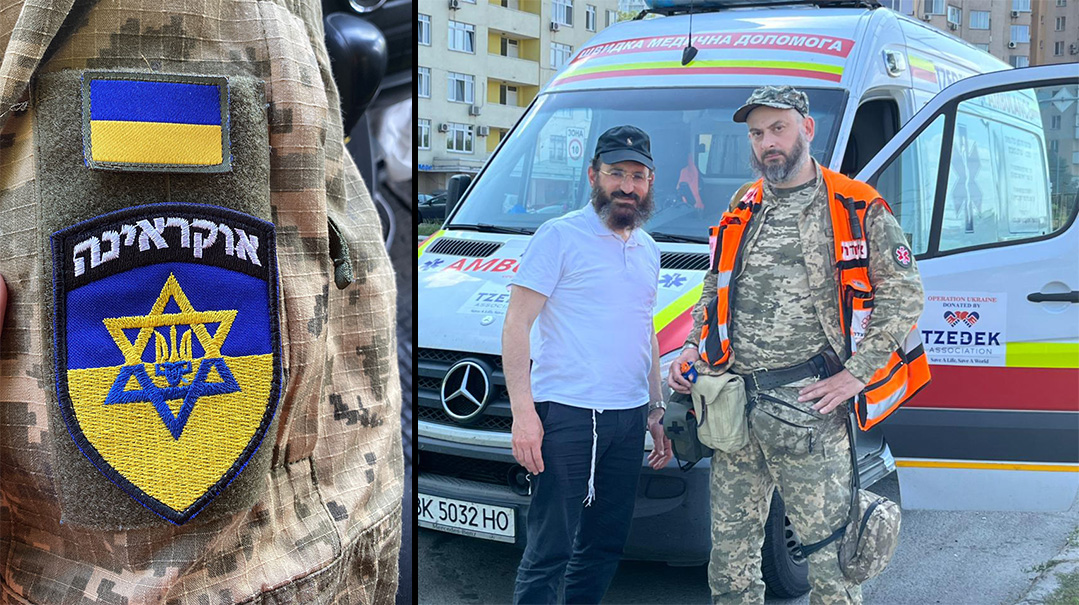
Rabbi Hillel Cohen and Michael Yonah Harshevsky (r) stand by an ambulance; a shoulder patch combining the Magen David and the Tryzub, a Ukrainian national symbol
“We have to create questions”
One of Harshevsky’s regular companions is a man responsible for some of the Ukrainian army’s progress on religious tolerance.
Rabbi Hillel Cohen, a Meah Shearim–born Breslover chassid who’s lived in Ukraine for 25 years, was featured in these pages at Pesach time for his daring missions to rescue stranded Jews from the front lines around Kyiv when the Russians first invaded.
His current activities are a sign of the see-sawing fortunes of the Ukrainian army. In a further sign of the war’s confinement to the east, our conversation catches him in Cherkas, the central town of the district that contains Uman. He’s there to meet the governor in his massive Soviet-era residence to discuss plans for resuming Rosh Hashanah in Uman. Aiming his cell phone camera down into the town’s central square, he shows the patriotic banners supporting the soldiers besieged in the giant Azovstal steelwork in Mariupol.
Day to day, Hillel Cohen is no longer rescuing women and children cowering in besieged cellars; now he’s focused on the thousand-plus Jewish soldiers in the army.
“There are major problems providing kosher food to the soldiers,” he says. “When it comes to keeping Shabbos in a battle zone, there’s not much that they can and should do, but for that, I’ve distributed copies of the Chofetz Chaim’s Machaneh Yisrael, written for Jewish soldiers.
“There are soldiers who want to put on tefillin, and we talk about how to keep them dry. I’d like to import a thousand pairs of tefillin plus waterproof tefillin cases.”
The attitude of most officers to Jewish observance, he says, has been very accepting, including arranging non-Shabbos shifts for Jewish soldiers where possible.
But given the lack of knowledge of most Jewish soldiers, kiruv is a major component.
“I always say that the job of rabbanim here in Ukraine is not to answer questions, but to create a situation where they start asking questions on their own.”
As soldiers, the question of moral warfare comes up regularly as well. “I get asked about treating Russian captives, and I tell them that as a moral army we have to treat prisoners fairly, whatever they do to our side.”
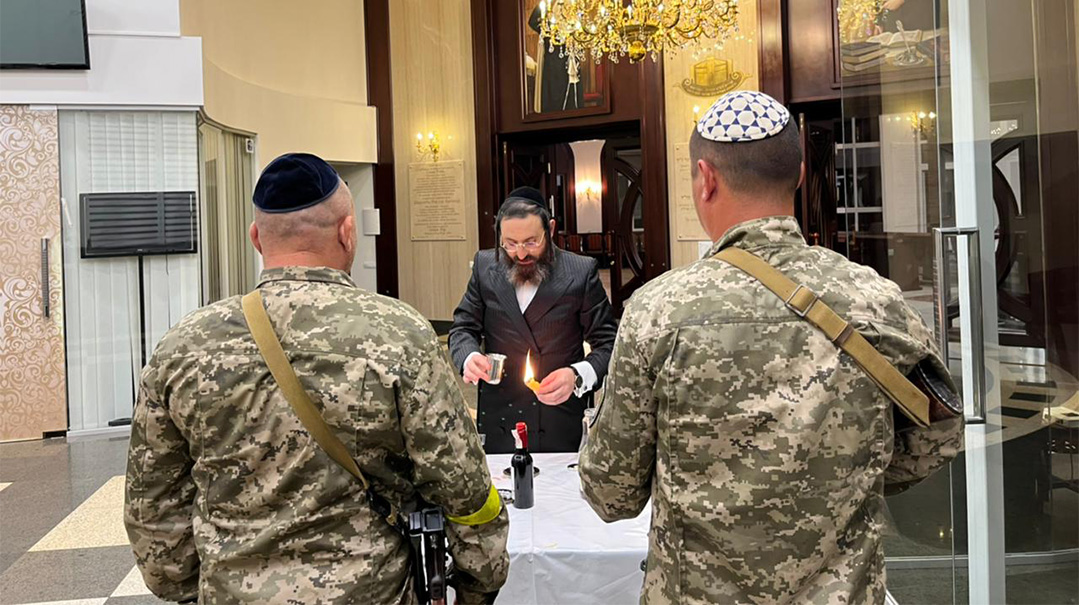
Rabbi Cohen makes Havdalah for two Jewish soldiers
No Surrender
Three and a half months into a war that has left large parts of the country in ruins, a future of conflict stretches before a country that is no stranger to bloodshed, both Jewish and Ukrainian.
As Russian military tactics finally seem to have found their mark, Ukrainians are not ready to back down.
“If Zelensky were to bow to European pressure to make peace with Putin while giving away the Donbas, he wouldn’t stay more than an hour in his job,” says Binyamin Chamara. “There is no appetite for compromises — we’ll fight to the last man to get even the Crimea back.”
Given Crimea’s ethnically Russian population, that may well be more mantra of faith than realistic policy. But it’s testament to the fact that Jewish soldiers are willing to fight for a country that was once a place to flee from.
That belief that Ukraine will weather the storm is echoed by Senior Lieutenant Valery Prusalovsky. Even as he contemplates the crippling shortages of supplies for his big guns, he’s confident that the line will hold.
“If we get weapons, this will take months. If not, we’ll fight for years.”
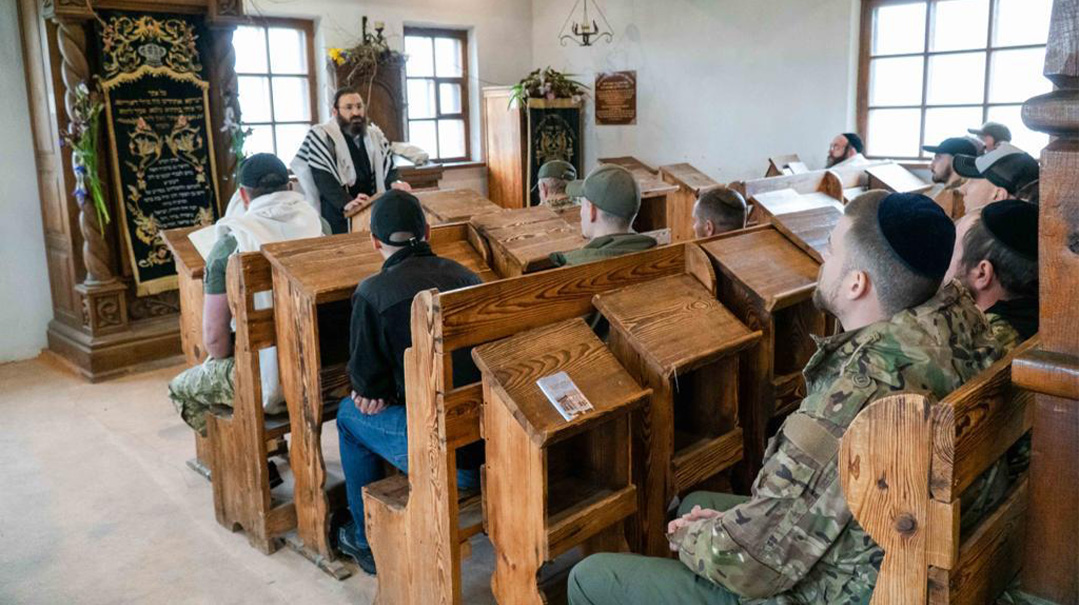
In the Baal Shem Tov’s shul in Mezhibuzh, Rabbi Hillel Cohen addresses a group of Jewish soldiers
(Originally featured in Mishpacha, Issue 915)
Oops! We could not locate your form.

